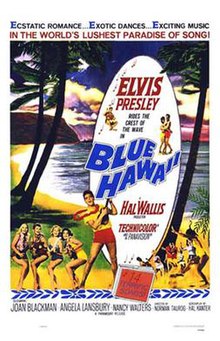Blue Hawaii
| Blue Hawaii | |
|---|---|

Theatrical release poster
|
|
| Directed by | Norman Taurog |
| Produced by | Hal B. Wallis |
| Screenplay by | Hal Kanter |
| Story by | Allan Weiss |
| Starring | |
| Music by | Joseph J. Lilley |
| Cinematography | Charles Lang, Jr. |
| Edited by | Terry O. Morse |
|
Production
company |
Hal Wallis Productions
|
| Distributed by | Paramount Pictures |
|
Release date
|
|
|
Running time
|
102 minutes |
| Country | United States |
| Language | English |
| Box office | $4.2 million (US/ Canada rentals) |
Blue Hawaii is a 1961 American musical romantic comedy film set in the state of Hawaii and starring Elvis Presley. The screenplay by Hal Kanter was nominated by the Writers Guild of America in 1962 in the category of Best Written American Musical. The movie opened at no. 2 in box office receipts for that week and despite mixed reviews from critics, finished as the 10th top-grossing movie of 1961 and 14th for 1962 on the Variety national box office survey, earning $5 million. The film won a fourth place prize Laurel Award in the category of Top Musical of 1961.
Chadwick Gates (Elvis Presley) has just gotten out of the Army, and is happy to be back in Hawaii with his surfboard, his beach buddies, and his girlfriend Maile Duval (Joan Blackman). His mother, Sarah Lee (Angela Lansbury), wants him to follow in his father's footsteps and take over management at the Great Southern Hawaiian Fruit Company, the family business, but Chad is reluctant, so he goes to work as a tour guide at his girlfriend's agency.
Blue Hawaii was the first of three Elvis films to be shot in Hawaii, followed by Girls! Girls! Girls! in 1962 and Paradise, Hawaiian Style in 1965. Producer Hal B. Wallis was keen to put Presley into a film that showed how the army affected a man. Actress Juliet Prowse, who had starred with Presley in GI Blues, was approached to be his love interest again. However, after her demands were put forward, Paramount decided to drop her as a possible candidate for the role, choosing Joan Blackman instead. Presley was apparently so pale before shooting that Wallis personally recommended a brand of tanning lamp to darken his skin. The film was announced in the fall of 1960 as Hawaii Beach Boy. At the time, film producer Walter Mirisch had a similar titled film in production, "Hawaii", and he was upset that Wallis had chosen such a similar name.
...
Wikipedia
